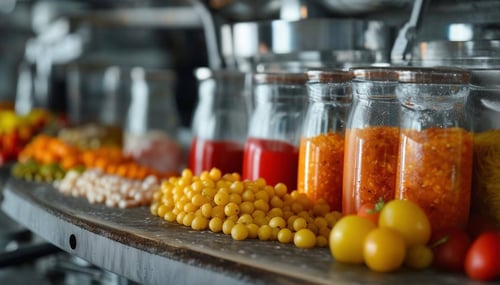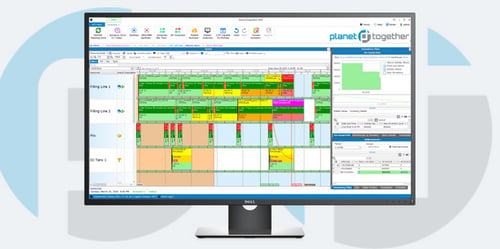Balancing Supply and Demand with AI-Powered Scheduling Tools in Food & Beverage Manufacturing
For Production Schedulers in Food and Beverage (F&B) manufacturing, balancing supply and demand is a constant challenge. Seasonal fluctuations, changing consumer preferences, raw material variability, and stringent compliance requirements make the task even more complex. Traditional scheduling methods often lack the flexibility and real-time responsiveness required to optimize production. However, AI-powered scheduling tools—particularly when integrated with advanced ERP systems like SAP, Oracle, Microsoft, Kinaxis, and Aveva—are revolutionizing how manufacturers manage production planning and execution.
This blog explores how AI-powered scheduling solutions, such as PlanetTogether, can help Production Schedulers in F&B manufacturing achieve better efficiency, minimize waste, and improve overall production performance.

The Challenges of Balancing Supply and Demand in F&B Manufacturing
Volatile Demand and Seasonal Variations
F&B manufacturers often face unpredictable demand patterns due to seasonality, promotions, and shifting consumer preferences. Schedulers must ensure that production meets demand without overproducing, which leads to waste, or underproducing, which results in stockouts.
Short Shelf Life and Perishability
Unlike many other industries, F&B manufacturing deals with perishable goods that require strict inventory turnover rates. Balancing supply with demand is crucial to preventing spoilage and maintaining product freshness.
Complex Production Constraints
From allergen segregation to processing time variations, production in the F&B industry requires careful sequencing. Traditional scheduling methods struggle to account for these factors, leading to inefficiencies.
Supply Chain Disruptions
Ingredient shortages, transportation delays, and regulatory compliance issues add another layer of complexity to scheduling. Schedulers need to respond swiftly to changes in raw material availability while ensuring smooth operations.
Compliance and Safety Regulations
F&B manufacturers must comply with strict food safety and quality regulations. Any deviation in production scheduling that affects compliance can lead to costly recalls, fines, and reputational damage.

How AI-Powered Scheduling Tools Optimize Supply and Demand Balancing
AI-driven scheduling tools like PlanetTogether, when integrated with ERP systems such as SAP, Oracle, Microsoft, Kinaxis, and Aveva, provide real-time data visibility and dynamic optimization to address these challenges. Here's how they enhance production scheduling:
Real-Time Demand Forecasting and Planning
By leveraging AI and machine learning, these systems analyze historical data, market trends, and real-time demand signals to create accurate demand forecasts. When integrated with SAP or Kinaxis, these forecasts feed directly into scheduling tools, allowing for proactive adjustments in production plans.
Dynamic Scheduling and Automated Adjustments
AI-powered scheduling software continuously optimizes production schedules based on changes in raw material availability, machine status, and order priority. Integration with Oracle and Microsoft ERP solutions ensures real-time updates, allowing schedulers to make informed decisions.
Optimized Production Sequences to Reduce Changeover and Downtime
Scheduling tools like PlanetTogether can analyze production constraints—such as allergen segregation, equipment cleaning times, and batch processing—to generate optimized production sequences. This reduces setup times, minimizes downtime, and enhances throughput.
Enhanced Resource Allocation
AI-powered scheduling tools optimize labor and machine utilization by analyzing workforce availability, shift patterns, and equipment capacity. Integration with Aveva enables seamless coordination between production scheduling and plant operations.
Minimizing Waste and Reducing Costs
Through predictive analytics, AI-driven scheduling tools can minimize overproduction, reduce raw material wastage, and prevent unnecessary energy consumption. By integrating with SAP and Kinaxis, companies can align procurement strategies with actual production needs, avoiding excessive inventory and waste.
Proactive Response to Supply Chain Disruptions
Supply chain disruptions are inevitable in F&B manufacturing. AI-powered tools enable real-time scenario modeling, allowing schedulers to simulate alternative production plans and mitigate risks. With Oracle or Microsoft integration, these insights can be shared across departments for rapid response.
Compliance and Quality Assurance
AI-powered scheduling ensures compliance with industry standards by embedding quality checks into the production plan. Integration with SAP or Aveva allows for traceability and batch tracking, ensuring that safety standards are met while optimizing production efficiency.
For Production Schedulers in Food and Beverage manufacturing, balancing supply and demand has never been more complex—or more critical. AI-powered scheduling tools like PlanetTogether, when integrated with ERP solutions such as SAP, Oracle, Microsoft, Kinaxis, or Aveva, provide real-time insights, automation, and optimization capabilities that significantly enhance production planning.
By adopting AI-driven scheduling, F&B manufacturers can reduce waste, improve efficiency, and respond to market fluctuations with agility. The future of scheduling is intelligent, data-driven, and essential for maintaining a competitive edge in the ever-evolving F&B industry.
Are you ready to take your manufacturing operations to the next level? Contact us today to learn more about how PlanetTogether can help you achieve your goals and drive success in your industry.
Topics: PlanetTogether Software, Integrating PlanetTogether, Food and Beverage Manufacturing, Real-Time Demand Forecasting and Planning, Dynamic Scheduling and Automated Adjustments, Proactive Response to Supply Chain Disruptions





















LEAVE A COMMENT